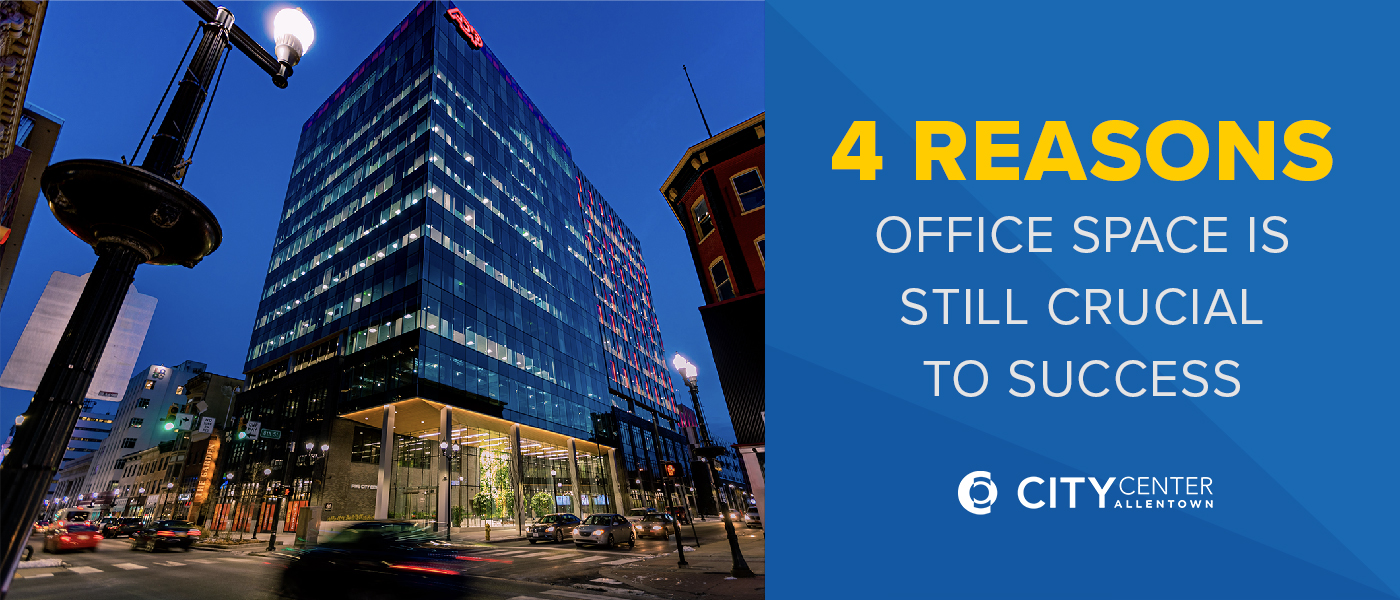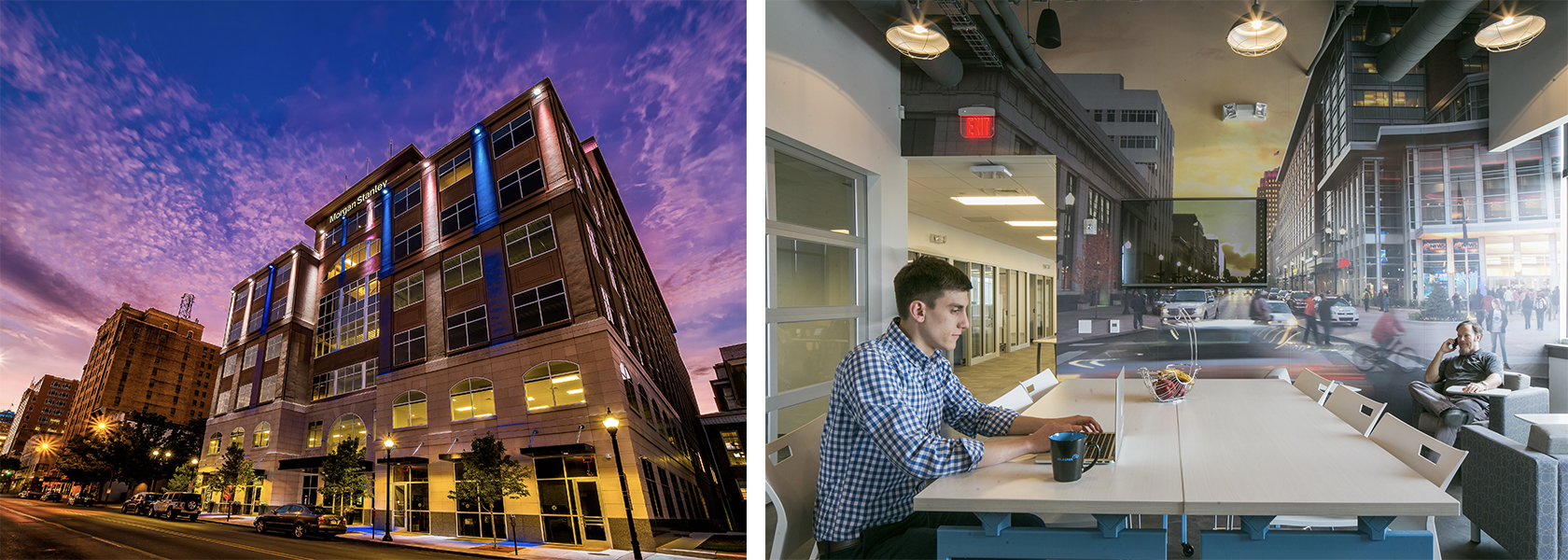
4 Reasons Office Space is Still Crucial to Success
Office workers may enjoy the novelty of working from home for now, but company leaders are focused on how well they work remotely, and what their office space will look like once employees transition back. When it’s deemed safe to return to work, should we? Society has proven we can work from home, so why bother to work in an office at all?
Here are a few reasons we believe, more than ever, shared physical space is crucial for a business to thrive:
1. WORKING TOGETHER LEADS TO CREATIVITY & INNOVATION
We shouldn’t underestimate the impact the office environment has on staying competitive through the fostering of new ideas. Mike Phillips, writer for Bisnow, explains how offices are a breeding ground for information exchange: “If I know something and you don’t know I know it, that piece of knowledge is essentially useless. An office is the best way to share knowledge around a company and to create a culture.”
Brainstorming sessions are natural to the office environment. Steve Jobs once told Harvard Business Review writer Walter Isaacson, “There’s a temptation in our networked age to think that ideas can be developed by e-mail and iChat. That’s crazy. Creativity comes from spontaneous meetings, from random discussions. You run into someone, you ask what they’re doing, you say ‘Wow,’ and soon you’re cooking up all sorts of ideas.”
If employees cannot collaborate, discuss ideas and debate one another in person, it’s going to have real effects on the quantity and quality of products or processes a company produces. Stanford economist Nicholas Bloom, who previously praised the benefits of working from home, describes the results of his research on the effects of remote working:
- Worldwide productivity decrease
- Decreased inspiration for creativity and innovation
- Trouble keeping staff motivated and focused
2. OFFICE SPACE ENABLES COLLABORATION
Janet Pogue-McLaurin, principal and global leader of the design and architectural firm Gensler, states, “Once the economy begins to recover and companies assess the efficacy of remote work, it’s possible that drops in collaboration or employee productivity will lead companies to once again grow their physical office footprints.”
Flexible work areas based on specific activities, personal preference and collaboration will likely spike.

Team collaboration, although possible remotely, is more feasible in an office. Face-to-face interactions help build trust, understanding, a strong corporate culture and a sense of a shared mission – all of which are necessary for a company’s success.

Kerry Kulp, partner of technology company Velaspan, located in downtown Allentown, explains how his company, built primarily to function remotely, chose to have a physical office for greater collaboration: “Even though we all have the option to work from home, we still choose to work in the office for the team dynamics, social aspect, and most importantly, to learn from each other. Our employees get to experience things they otherwise wouldn’t from being in the office.”
3. SHARING SPACE BOOSTS PRODUCTIVITY
In The Atlantic, Derek Thompson writes, “Beyond lost creativity and companionship, the gravest threat to many companies from remote work is that it breaks the social bonds that are necessary to productive teamwork.” He discusses Google’s research project on understanding the company’s most productive groups:
- Non-face-to-face communication makes it difficult to cultivate psychological safety (or knowing your team accepts and respects you for who you are), which is the most important quality to productivity
- Non-face-to-face communication creates misunderstandings and prevents social exchanges that help cultivate psychological safety: jokes, encouragement and validation
Wall Street Journal writer Betsy Morris describes how remote working can cause people to become less productive: “Staying confined at home greatly limits external stimuli and can trigger a physiological and psychological response similar to the behavior of animals in hibernation…slow down, sleep more and get more forgetful, scientists say.”
Working in an office enables quicker, more effective communication, a crucial aspect of productivity. Being able to walk right over to your coworker rather than trying to explain something via lengthy emails is an unmatched positive of working in an office.
Company leaders should not look at the relevancy of office space primarily from a cost-savings perspective without considering the financial impacts on human capital lost through decreased engagement and productivity, as it relates to the space. Kerry Kulp illustrates,
“Some large companies may scale down their real estate footprint if it’s purely a monetary decision, but if they really think about the impact on their team dynamics and how it affects their overall business, I don’t know that it’s worth the cost savings.”
4. OFFICES SATISFY OUR SOCIAL NEEDS
Working in a physical office creates a sense of community, which helps satisfy our need for social engagement. Not only is in-person contact crucial for brainstorming and debating ideas, but there’s the social element of making eye contact, laughing, encouraging and looking forward to the next companywide social gathering. As Kerry Kulp attests,
“The social aspect of working in the office definitely influences our employees’ desire to choose to work in the office versus from home. We have a very social environment with team and companywide events, coworkers taking lunch together, and getting together after work. We’re trying to maintain the social dynamic we experience in the office through virtual happy hours, but it’s not the same.”
For years people have met longtime friends, business partners, even spouses in the workplace. Stanford economist Nicholas Bloom explains how in a study of participants working from home, they were asked whether they wanted to keep working remotely or return to the office- the findings:
- 50% of them wanted to return to the office, even with having an average commute of 40 minutes each way because of the social company.
Bloom fears that “an extended period of working from home will not only kill office productivity but is building a mental health crisis.”
Long after the COVID-19 virus subsides, it will leave lasting impressions on us, changing the way we work, how we think about work and where we work. We believe more than ever, a physical space to connect and learn from one another is crucial for a business to thrive once it’s safe for us to gather again.
Whether you’re thinking of downsizing, setting up a satellite office or experimenting with flexible lease terms and/or space options, we’d love to talk with you! Start a conversation about your space or check out our available space here.
Sources (in the order referenced):
Bisnow Future of Work: “Offices are about to Cause Productivity to Explode”
Harvard Business Review: “The Real Leadership Lessons of Steve Jobs”
Stanford News: “The Productivity Pitfalls of Working from Home in the Age of COVID-19”
National Real Estate Investor: “Open-Plan Offices and Shared Spaces were the ‘Disruptors’ of the Decade. Then a Virus Arrived.”
The Atlantic: “The Coronavirus is Creating a Huge, Stressful Experiment in Working from Home”
Wall Street Journal: “Social Isolation’s High Physical and Psychological Toll”